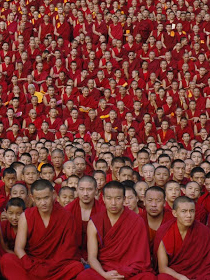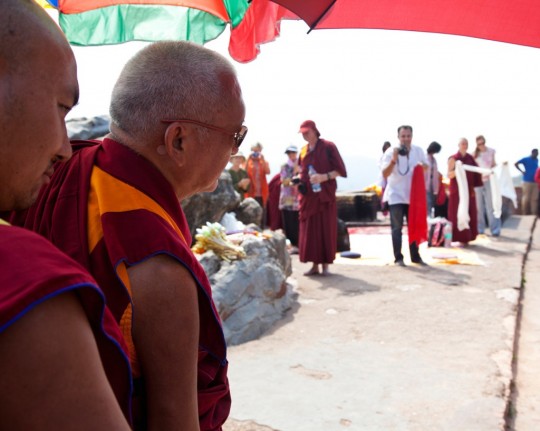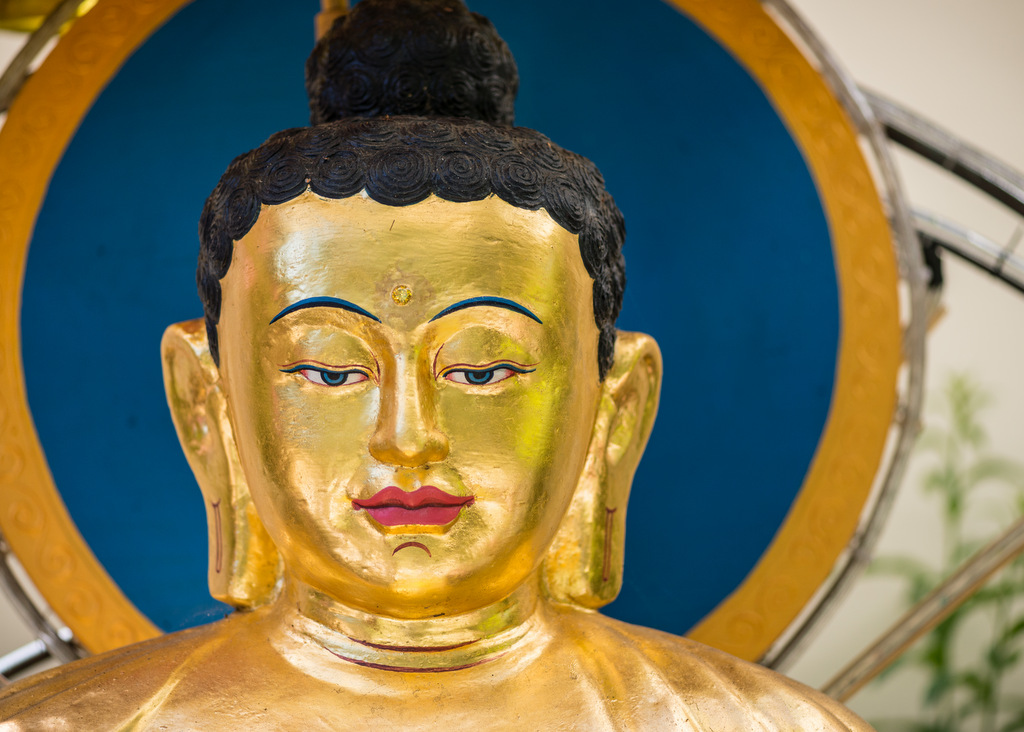- Home
- FPMT Homepage
Foundation for the Preservation of the Mahayana Tradition
The FPMT is an organization devoted to preserving and spreading Mahayana Buddhism worldwide by creating opportunities to listen, reflect, meditate, practice and actualize the unmistaken teachings of the Buddha and based on that experience spreading the Dharma to sentient beings. We provide integrated education through which people’s minds and hearts can be transformed into their highest potential for the benefit of others, inspired by an attitude of universal responsibility and service. We are committed to creating harmonious environments and helping all beings develop their full potential of infinite wisdom and compassion. Our organization is based on the Buddhist tradition of Lama Tsongkhapa of Tibet as taught to us by our founders Lama Thubten Yeshe and Lama Thubten Zopa Rinpoche.
- Willkommen
Die Stiftung zur Erhaltung der Mahayana Tradition (FPMT) ist eine Organisation, die sich weltweit für die Erhaltung und Verbreitung des Mahayana-Buddhismus einsetzt, indem sie Möglichkeiten schafft, den makellosen Lehren des Buddha zuzuhören, über sie zur reflektieren und zu meditieren und auf der Grundlage dieser Erfahrung das Dharma unter den Lebewesen zu verbreiten.
Wir bieten integrierte Schulungswege an, durch denen der Geist und das Herz der Menschen in ihr höchstes Potential verwandelt werden zum Wohl der anderen – inspiriert durch eine Haltung der universellen Verantwortung und dem Wunsch zu dienen. Wir haben uns verpflichtet, harmonische Umgebungen zu schaffen und allen Wesen zu helfen, ihr volles Potenzial unendlicher Weisheit und grenzenlosen Mitgefühls zu verwirklichen.
Unsere Organisation basiert auf der buddhistischen Tradition von Lama Tsongkhapa von Tibet, so wie sie uns von unseren Gründern Lama Thubten Yeshe und Lama Thubten Zopa Rinpoche gelehrt wird.
- Bienvenidos
La Fundación para la preservación de la tradición Mahayana (FPMT) es una organización que se dedica a preservar y difundir el budismo Mahayana en todo el mundo, creando oportunidades para escuchar, reflexionar, meditar, practicar y actualizar las enseñanzas inconfundibles de Buda y en base a esa experiencia difundir el Dharma a los seres.
Proporcionamos una educación integrada a través de la cual las mentes y los corazones de las personas se pueden transformar en su mayor potencial para el beneficio de los demás, inspirados por una actitud de responsabilidad y servicio universales. Estamos comprometidos a crear ambientes armoniosos y ayudar a todos los seres a desarrollar todo su potencial de infinita sabiduría y compasión.
Nuestra organización se basa en la tradición budista de Lama Tsongkhapa del Tíbet como nos lo enseñaron nuestros fundadores Lama Thubten Yeshe y Lama Zopa Rinpoche.
A continuación puede ver una lista de los centros y sus páginas web en su lengua preferida.
- Bienvenue
L’organisation de la FPMT a pour vocation la préservation et la diffusion du bouddhisme du mahayana dans le monde entier. Elle offre l’opportunité d’écouter, de réfléchir, de méditer, de pratiquer et de réaliser les enseignements excellents du Bouddha, pour ensuite transmettre le Dharma à tous les êtres. Nous proposons une formation intégrée grâce à laquelle le cœur et l’esprit de chacun peuvent accomplir leur potentiel le plus élevé pour le bien d’autrui, inspirés par le sens du service et une responsabilité universelle. Nous nous engageons à créer un environnement harmonieux et à aider tous les êtres à épanouir leur potentiel illimité de compassion et de sagesse. Notre organisation s’appuie sur la tradition guéloukpa de Lama Tsongkhapa du Tibet, telle qu’elle a été enseignée par nos fondateurs Lama Thoubtèn Yéshé et Lama Zopa Rinpoché.
Visitez le site de notre Editions Mahayana pour les traductions, conseils et nouvelles du Bureau international en français.
Voici une liste de centres et de leurs sites dans votre langue préférée
- Benvenuto
L’FPMT è un organizzazione il cui scopo è preservare e diffondere il Buddhismo Mahayana nel mondo, creando occasioni di ascolto, riflessione, meditazione e pratica dei perfetti insegnamenti del Buddha, al fine di attualizzare e diffondere il Dharma fra tutti gli esseri senzienti.
Offriamo un’educazione integrata, che può trasformare la mente e i cuori delle persone nel loro massimo potenziale, per il beneficio di tutti gli esseri, ispirati da un’attitudine di responsabilità universale e di servizio.
Il nostro obiettivo è quello di creare contesti armoniosi e aiutare tutti gli esseri a sviluppare in modo completo le proprie potenzialità di infinita saggezza e compassione.
La nostra organizzazione si basa sulla tradizione buddhista di Lama Tsongkhapa del Tibet, così come ci è stata insegnata dai nostri fondatori Lama Thubten Yeshe e Lama Zopa Rinpoche.
Di seguito potete trovare un elenco dei centri e dei loro siti nella lingua da voi prescelta.
- 欢迎 / 歡迎
简体中文
“护持大乘法脉基金会”( 英文简称:FPMT。全名:Foundation for the Preservation of the Mahayana Tradition) 是一个致力于护持和弘扬大乘佛法的国际佛教组织。我们提供听闻,思维,禅修,修行和实证佛陀无误教法的机会,以便让一切众生都能够享受佛法的指引和滋润。
我们全力创造和谐融洽的环境, 为人们提供解行并重的完整佛法教育,以便启发内在的环宇悲心及责任心,并开发内心所蕴藏的巨大潜能 — 无限的智慧与悲心 — 以便利益和服务一切有情。
FPMT的创办人是图腾耶喜喇嘛和喇嘛梭巴仁波切。我们所修习的是由两位上师所教导的,西藏喀巴大师的佛法传承。
繁體中文
護持大乘法脈基金會”( 英文簡稱:FPMT。全名:Found
ation for the Preservation of the Mahayana Tradition ) 是一個致力於護持和弘揚大乘佛法的國際佛教組織。我們提供聽聞, 思維,禪修,修行和實證佛陀無誤教法的機會,以便讓一切眾生都能 夠享受佛法的指引和滋潤。 我們全力創造和諧融洽的環境,
為人們提供解行並重的完整佛法教育,以便啟發內在的環宇悲心及責 任心,並開發內心所蘊藏的巨大潛能 — 無限的智慧與悲心 – – 以便利益和服務一切有情。 FPMT的創辦人是圖騰耶喜喇嘛和喇嘛梭巴仁波切。
我們所修習的是由兩位上師所教導的,西藏喀巴大師的佛法傳承。 察看道场信息:
- FPMT Homepage
- News/Media
-
- Study & Practice
-
-
- About FPMT Education Services
- Latest News
- Programs
- New to Buddhism?
- Buddhist Mind Science: Activating Your Potential
- Heart Advice for Death and Dying
- Discovering Buddhism
- Living in the Path
- Exploring Buddhism
- FPMT Basic Program
- FPMT Masters Program
- FPMT In-Depth Meditation Training
- Maitripa College
- Lotsawa Rinchen Zangpo Translator Program
- Universal Education for Compassion & Wisdom
- Online Learning Center
-
- Prayers & Practice Materials
- Overview of Prayers & Practices
- Full Catalogue of Prayers & Practice Materials
- Explore Popular Topics
- Benefiting Animals
- Chenrezig Resources
- Death & Dying Resources
- Lama Chopa (Guru Puja)
- Lama Zopa Rinpoche: Compendium of Precious Instructions
- Lama Zopa Rinpoche: Life Practice Advice
- Lama Zopa Rinpoche Practice Series
- Lamrim Resources
- Mantras
- Prayer Book Updates
- Purification Practices
- Sutras
- Thought Transformation (Lojong)
- Audio Materials
- Dharma Dates - Tibetan Calendar
- Translation Services
- Publishing Services
- Ways to Offer Support
- Prayers & Practice Materials
-
- Teachings and Advice
- Find Teachings and Advice
- Lama Zopa Rinpoche Advice Page
- Lama Zopa Rinpoche: Compendium of Precious Instructions
- Lama Zopa Rinpoche Video Teachings
- ༧སྐྱབས་རྗེ་བཟོད་པ་རིན་པོ་ཆེ་མཆོག་ནས་སྩལ་བའི་བཀའ་སློབ་བརྙན་འཕྲིན།
- Podcasts
- Lama Yeshe Wisdom Archive
- Buddhism FAQ
- Dharma for Young People
- Resources on Holy Objects
- Teachings and Advice
-
-
*If a menu item has a submenu clicking once will expand the menu clicking twice will open the page.
-
-
- Centers
-
- Teachers
-
- Projects
-
-
-
-
*If a menu item has a submenu clicking once will expand the menu clicking twice will open the page.
-
-
- FPMT
-
-
-
-
-
If you have fear of some pain or suffering, you should examine whether there is anything you can do about it. If you can, there is no need to worry about it; if you cannot do anything, then there is also no need to worry.
His Holiness the Dalai Lama
-
-
-
- Shop
-
-
-
The Foundation Store is FPMT’s online shop and features a vast selection of Buddhist study and practice materials written or recommended by our lineage gurus. These items include homestudy programs, prayers and practices in PDF or eBook format, materials for children, and other resources to support practitioners.
Items displayed in the shop are made available for Dharma practice and educational purposes, and never for the purpose of profiting from their sale. Please read FPMT Foundation Store Policy Regarding Dharma Items for more information.
-
-
Lama Zopa Rinpoche News and Advice
10
Lama Zopa Rinpoche Visits Tushita Mahayana Meditation Centre
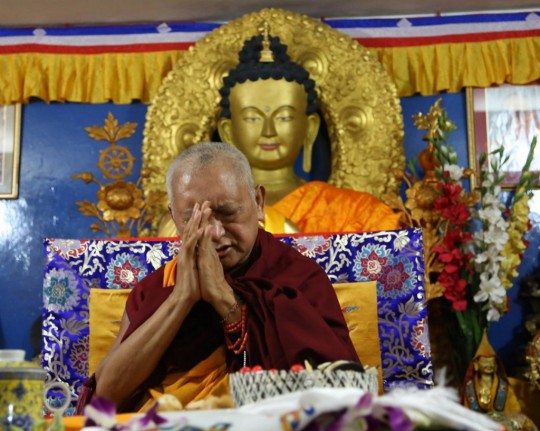
Lama Zopa Rinpoche at Tushita Mahayana Meditation Centre, New Dehli, India, January 2015. Photo courtesy of Tushita Mahayana Meditation Centre’s Facebook page.
Lama Zopa Rinpoche gave teachings and an oral transmission of the Golden Light Sutra at Tushita Mahayana Meditation Centre in New Dehli, India, between January 25-31. Ven. Sarah Thresher, who was there, shared the following:
“Rinpoche gave five teachings on the Golden Light Sutra. Ven. Kabir Saxena requested the transmission a few days after Rinpoche arrived, and Rinpoche immediately agreed. We were all very happy because of the enormous benefits the sutra has. In fact, Rinpoche was giving the transmission when US President Barack Obama was in Delhi attending Indian Republic Day. The idea was that Rinpoche would start the transmission and continue whenever he passes through Delhi. So far we reached into Chapter 7, ‘The Four Great Kings.’
“Attendance was very good, despite the late hours, and Rinpoche preceded each day of transmission with a teaching. The gompa [at Tushita Mahayana Meditation Centre] has been newly painted and decorated and it was full with Indians, Westerners and Tibetans. Most of the people attending lived in Delhi and Rinpoche commented on the new surge of interest in Buddhism that is now taking place with more and more young educated Indians taking a serious interest in Buddhist studies as they look for answers to the problems they have in their lives.”
Recitation of the Golden Light Sutra is one of Lama Zopa Rinpoche’s Vast Visions for FPMT. FPMT Education Services has created a resource page to help you learn more about and start reciting the Golden Light Sutra.
Lama Zopa Rinpoche is the spiritual director of the Foundation for the Preservation of Mahayana Tradition (FPMT), a Tibetan Buddhist organization dedicated to the transmission of the Mahayana Buddhist tradition and values worldwide through teaching, meditation and community service.
- Tagged: golden light sutra, lama zopa rinpoche, tushita mahayana meditation centre, ven. sarah thresher
- 0
9
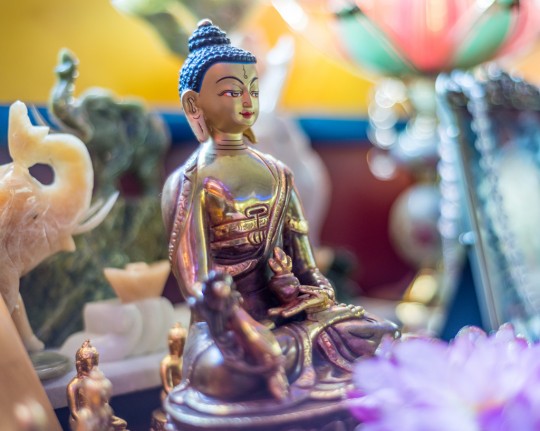
Altar detail at Kachoe Dechen Ling, Aptos, California, 2014. Photo by Chris Majors.
“At the beginning, when the Sangha was flourishing, Lama Yeshe got all the monks and nuns to take turns to cook for the other Sangha members. Ven. Pemo didn’t know how to cook, so when it was her turn, she put some vegetables in oil and then served them raw,” Lama Zopa Rinpoche said in November 2014 to Ven. Ailsa Cameron.
“If you know how to make food, it is very beneficial. The highest benefit – bringing great purification of negative karma and delusions and collecting merit – is to offer delicious food to the guru. You can also make so many people happy by making delicious food for them.
“So, bodhisattvas learn anything to benefit sentient beings.”
Scribed by Ven. Ailsa Cameron, November 2014, Bendigo, Australia. Lightly edited by Michael Jolliffe for inclusion on FPMT.org.
More advice from Rinpoche can be found on the page “Advice from Lama Zopa Rinpoche” on FPMT.org.
More information, photos and updates about FPMT spiritual director Lama Zopa Rinpoche can be found on Rinpoche’s webpage. If you’d like to receive news of Lama Zopa Rinpoche via email, sign up to Lama Zopa Rinpoche News.
6
How to Benefit the Bodies and Minds of Birds [Video]
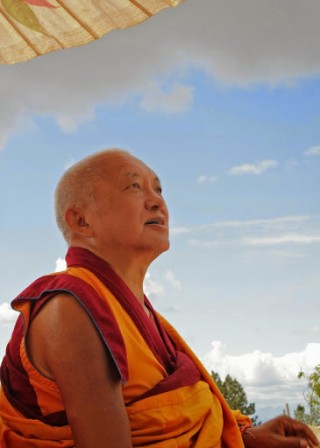
Lama Zopa Rinpoche, Amitabha celebration day, Buddha Amitabha Pure Land, Washington, US, August 2014. Photo by Ven. Sherab.
In August 2014, Lama Zopa Rinpoche spent some time at Buddha Amitabha Pure Land in the United States. While there, he explained on camera some of the ways he and Buddha Amitabha Pure Land residents benefit local birds with a very special bird feeder and bird bath.
The roof of the large bird feeder has painted on it the mantra from the sutra Pagpa Chulung Rolpai Do, which purifies 100,000 eons of the birds’ negative karma just by seeing it, and the Lotus Pinnacle of Amoghapasha mantra, which purifies 1,000 eons of the birds’ negative karma when they pass underneath it for food. (You can find these mantras embroidered on the Precious Mantra Hat available through the Foundation Store.)
Just offering the birds seed blessed with mantras is incredibly helpful, Rinpoche commented, because the blessings benefit the birds’ bodies and minds and it means that the birds look for less insects to eat, which not only protects the insects from death, but also reduces the amount of killing karma the birds accumulate.
The bird bath is similarly beneficial as it is filled with water blessed by a mantra of Padmasambhava and crushed mani pills to help the birds achieve enlightenment.
At the end of the video, Rinpoche mentions that residents at Buddha Amitabha Pure Land also make charity of food and Dharma to the various ant nests around the property using How to Make Charity to Ants, a text compiled by Lama Zopa Rinpoche and inspired by a text written by Ngulchu Dharmabhadra, a well-known yogi and lineage lama.
Find more videos of Lama Zopa Rinpoche on FPMT.org.
Learn more about Lama Zopa Rinpoche, spiritual director of the Foundation for the Preservation of Mahayana Tradition (FPMT), and Rinpoche’s vision for a better world. Sign up to receive news and updates.
- Tagged: advice, advice from lama zopa rinpoche, animals, ants, birds, buddha amitabha pure land, lama zopa rinpoche, video
- 0
4
Remembering the Kindness of the Guru
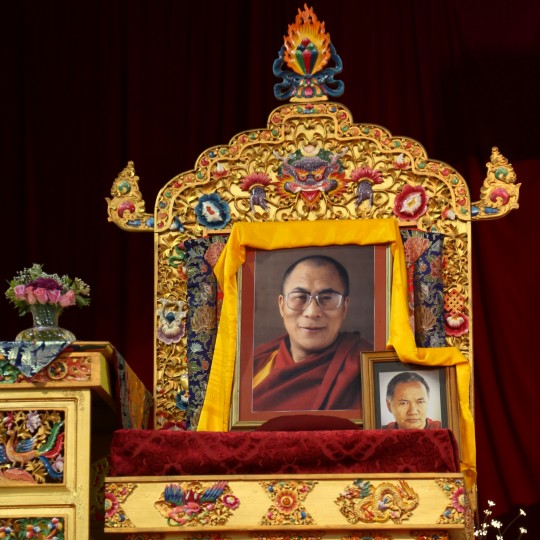
Photos of His Holiness the Dalai Lama and Lama Yeshe on the throne next to Lama Zopa Rinpoche at the retreat in Australia, October 2014. Photo by Ven. Thubten Kunsang.
“Up to now, what we have been able to accomplish, benefiting this world in various ways, is, I think, basically through the kindness of the guru: His Holiness, who is the only object of refuge of all sentient beings and the originator of all sentient beings’ happiness; and then, secondly, the founder of this organization, Lama Yeshe, whose holy name is extremely rare to mention, who is kinder than all the three time buddhas; and then the kindness of many other gurus,” Lama Zopa Rinpoche has taught. “So, what we have been able to accomplish so far depends on how much guru devotion practice we did correctly, it is the result of that.”
These days, many FPMT students and students of Lama Zopa Rinpoche have not had the opportunity to see teachings from FPMT founder Lama Yeshe and to develop a connection with Lama Yeshe. Fortunately, there are videos available to watch online and on DVD. The Lama Yeshe Wisdom Archive offers videos of Lama Yeshe on their website and on YouTube.
WATCH VIDEO: Lama Yeshe “Making the Most of Your Life”
In addition, there are many videos online of His Holiness the Dalai Lama.
So as we remember the kindness of these teachers, we can imagine in our minds their gestures and voices in addition to their images.
Lama Zopa Rinpoche is the spiritual director of the Foundation for the Preservation of Mahayana Tradition (FPMT), a Tibetan Buddhist organization dedicated to the transmission of the Mahayana Buddhist tradition and values worldwide through teaching, meditation and community service.
- Tagged: lama yeshe, lama yeshe wisdom archive, video
- 0
3
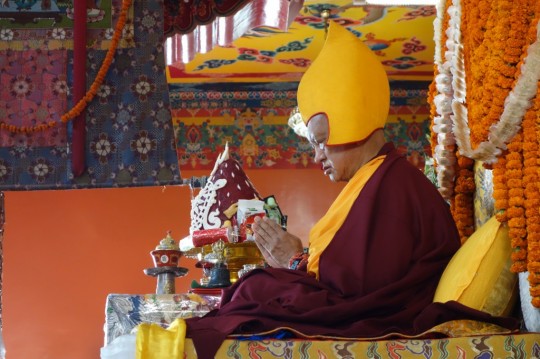
Lama Zopa Rinpoche reciting the names of the 35 Buddhas during a long life puja at Kopan Monastery, Nepal, December 2104. Photo by Ven. Roger Kunsang.
In late November and early December 2014, Lama Zopa Rinpoche taught as part of the annual month-long Kopan course at Kopan Monastery in Nepal. Rinpoche’s teachings covered a variety of subjects. What follows is an excerpt from a lightly edited transcript and video extract:
How to take care of your life? How to take care of your life? Life used for anger, to harm others, to
harm others; that is what in the world people do. You use your life, your intelligence, all that you
learned from school, from kindergarten, school, college, university, your human body, that which you have been taking care of for years and years, from childhood time, your education and your wealth, you use them to harm others. You live your life for anger, to work for anger, to destroy the world, to harm others. Then you live your life with attachment, then also you harm other sentient beings. Then ignorance harms, of course, yourself and sentient beings. By following those three poisonous minds you harm yourself, you harm others. So much suffering. So much suffering.
Now, the way of taking care of life, the correct way of taking care of your life, is to be non-attached – a positive mind of non-anger, non-ignorance, and non-attachment should be there. So there is taking care of your life with satisfied, inner happiness, a fully satisfied mind renouncing samsara. A fully satisfied mind, a totally happy, fully satisfied mind of renunciation of this life and renunciation of samsara – this is taking care of your life with renunciation. …
Watch “How to Take Care of Your Life” on YouTube.
You can find more MP3 recordings, transcripts and short video excerpts of Rinpoche’s teachings from the Kopan course on FPMT.org.
Learn more about Lama Zopa Rinpoche, spiritual director of the Foundation for the Preservation of Mahayana Tradition (FPMT), and Rinpoche’s vision for a better world. Sign up to receive news and updates.
30
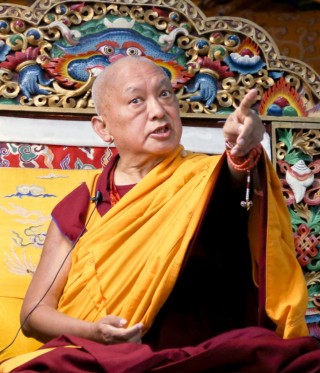
Lama Zopa Rinpoche teaching at Kopan Monastery, Nepal, December 2014. Photo by Ven. Thubten Kunsang.
In December 2014, Lama Zopa Rinpoche taught as part of the annual month-long Kopan course at Kopan Monastery in Nepal. Rinpoche taught on a variety of subjects, including how all things are “merely labeled by the mind.” What follow are a lightly edited transcript and video extract, made for Rinpoche Available Now, a new project from FPMT.org to bring Rinpoche’s major teachings to the public as they happen:
Another example. Okay. A design like this on a blackboard, a design like that is A. Okay? So you see A. You are taught A and you see A. You see A. But now go back, now you go back to your childhood time, now you back to your childhood time, to your childhood time before you were taught “This is A.” You go back to your childhood time before you learned A. So what you see at first is a design like this on the blackboard. Okay? It is just a design. You don’t see that “This is A.” You may be seeing A but you are not seeing “This is A.” You are not seeing that, you are not yet taught that. Because you are not taught that yet, so you see a design like this. Okay? Then your parents or teacher, somebody, introduces you, labels “A.” The person labeled “This is A.” They labeled it, they named it, from the mind. They taught you, so you believe it. Before that you see the base, you are not seeing “This is A.” You understand? It is very clear. You don’t see “This is A,” you see the base, just the base of the A. When you are taught by your parents or a teacher who label “This is A,” labeled by their mind “This is A,” then you follow, you believe that. Then your mind labels A. Then your mind merely… I want to add this one [word] even now: it is not only labeled but merely labeled A. Merely labeled A. Merely labeled A. Then after that… Your mind merely labeled A on that base that is like this, then after that, then there is the appearance of A. Then there is the appearance of A to you. Then you see A. Only then you see A. So your seeing A is dependent on first your mind labeling A, your mind merely imputing A, and that depends on somebody teaching you, introducing you, with their mind merely labeling A. So A came from your mind. You see? If you are not taught, if your mind does not merely label A, you don’t see “This is A,” at all. You see? That’s clear. Now the A that appears, that you see, came from your mind. Like that all phenomena came from your mind. Okay?
Watch “The Letter ‘A’: All Phenomena Come from the Mind” on YouTube.
You can find more MP3 recordings, transcripts and short video excerpts of Rinpoche’s teachings from the Kopan course on FPMT.org.
Learn more about Lama Zopa Rinpoche, spiritual director of the Foundation for the Preservation of Mahayana Tradition (FPMT), and Rinpoche’s vision for a better world. Sign up to receive news and updates.
- Tagged: advice, emptiness, lama zopa rinpoche, rinpoche available now, video
- 0
29
“My very dear most kind precious [student],” Lama Zopa Rinpoche wrote to a student who had written to Rinpoche about his book How to Practice Dharma, published by the Lama Yeshe Wisdom Archive. “Skies of thanks for your discovering Dharma, trying to practice Dharma with every action. Thank you very, very much. That’s the real Dharma. Even in the monasteries studying so much extensive philosophy, but sometimes Dharma gets left out for some people. Looking like practicing Dharma, but not practicing Dharma.
“It is so precious what you have discovered, what you experienced. You discovered Dharma,
what Dharma is. Numberless thanks again.”
You can read the students letter and Rinpoche’s response as a PDF. More advice from Rinpoche can be found on the page “Advice from Lama Zopa Rinpoche” on FPMT.org.
More information, photos and updates about FPMT spiritual director Lama Zopa Rinpoche can be found on Rinpoche’s webpage. If you’d like to receive news of Lama Zopa Rinpoche via email, sign up to Lama Zopa Rinpoche News.
- Tagged: advice, lama zopa rinpoche
- 0
28
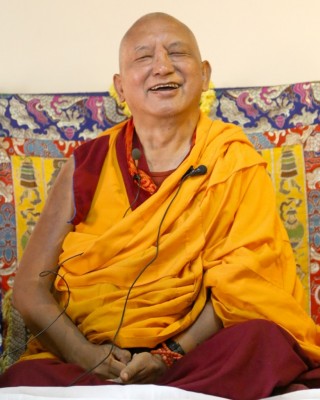
Lama Zopa Rinpoche, Bangalore, India, March 2014. Photo by Ven. Thubten Kunsang.
“So, what is it that brings all that [Dharma] happiness?” Lama Zopa Rinpoche asks in The Joy of Compassion, a free ebook from Lama Yeshe Wisdom Archive. “It’s cherishing sentient beings; living your life cherishing sentient beings. Not that I actually do this myself, but intellectually, it’s what I think. Cherish sentient beings first; put enlightenment second.
“Why do I say put enlightenment second? For example, when you go into the kitchen, you’re looking for food, not crockery; your motivation is not to get a plate but delicious food. You go into the kitchen with food on your mind. But although your main motivation is to get food, you do need something to put it on – unless you can carry soup in your hands! Anyway, I’m joking again.
“Of course, enlightenment is extremely important because without it you cannot work perfectly for sentient beings. You cannot be a perfect guide, knowing, seeing directly, every sentient being’s mind, level of karma, intelligence, wishes and characteristics, as well as the various methods that suit their individual dispositions. But what should be in your heart is sentient beings as the reason for your attaining enlightenment. The first priority in your heart should be the happiness of sentient beings; sentient beings in your heart. What should be the first thing in your heart, in your life, the goal of your life? Sentient beings.”
Learn more about Lama Zopa Rinpoche, spiritual director of the Foundation for the Preservation of Mahayana Tradition (FPMT), and Rinpoche’s vision for a better world. Sign up to receive news and updates.
- Tagged: lama yeshe wisdom archive, lama zopa rinpoche
- 0
27
Lama Zopa Rinpoche offered this advice in a letter to a student who offered gold to 1,000 buddha statues at Kopan Monastery in Nepal:
I thought to tell of some benefits.
In the time of Buddha Kashyapa, one person offered gold to a cement elephant and was born having an elephant that was gold and had golden kaka. The king at that time confiscated the elephant, at which time the elephant dissolved into the ground, while for the man, his karma was to get another, similar elephant.
Another benefit of offering gold is to be born with golden colored skin. Like that, unbelievable benefits. Unbelievable like that.
If someone offers a small flower or rice to a Buddha statue, a stupa or scripture, then the benefit extends from then up to enlightenment. Amazing, amazing. It is said in the sutra Piled Flowers, on top of that benefit, you achieve ultimate happiness – liberation from the causes of delusion and karma – and on top of that, full enlightenment – all the realizations and omniscient mind. After this, then you liberate numberless hell beings, pretas, animals, humans, suras and asuras from the ocean of samsaric sufferings and bring them to full enlightenment. When all beings are brought to enlightenment, only then are all the results of offering achieved. So by offering gold, then wow, wow, wow. Can you imagine the result! From only a tiny offering (of a flower or rice) so much benefit is received due to that statue, etc. So really, holy objects are wish-fulfilling gems – so unbelievably precious.
Another story: In ancient times in India, there were four fully ordained monks, fully ordained but not aryas with the direct realization of emptiness. One person offered food to these monks and was later reborn as King Kashika. But now you are offering gold so can you imagine the result. Wow! Wow! Wow! Wow!
Another benefit, in order for you to get an idea, comes from the Sutra of the Mudra, Developing the Power of Devotion. In that it says that someone who merely sees the image of a Buddha, great or small, immediately creates numberless merits. The food of the devas is nectar and their cloth is extremely precious – all the wealth of the world is not enough to buy their ornaments. Compared to making an offering of devas’ food and cloth 100 times to solitary realizers equaling the sand grains of the universe for 100 eons, to just look at the statue of Buddha has unimaginably more benefits. Wow! Wow! So imagine now offering gold. And offering has far, far, far more merit than seeing Buddha.
Now you see why we build big statues that people from all over the world come to see. You see how the benefit is there.
Thank you very much for your understanding,
Lama Zopa Rinpoche
Scribing, editing and any mistakes made belong to Tenzin Namdrol, Kopan Monastery, Nepal, December 2012.
You can find more advice from FPMT Spiritual Director Lama Zopa Rinpoche on FPMT.org.
- Tagged: advice, advice from lama zopa rinpoche, gold, holy object, lama zopa rinpoche, offerings, statues
- 0
26
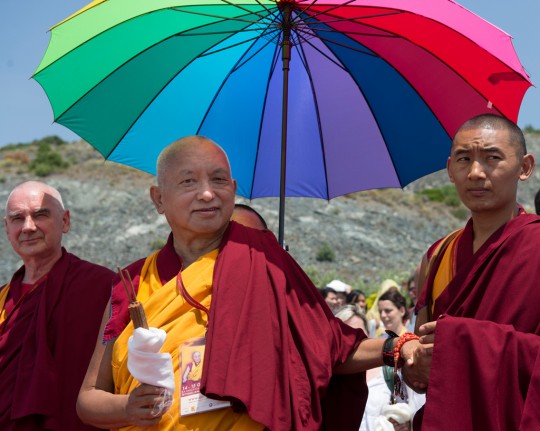
Lama Zopa Rinpoche with Vens. Roger Kunsang and Sangpo, Italy, June 2014. Photo by Matteo Passigato.
Lama Zopa Rinpoche gave teachings in New Delhi, India on January 23-26. On January 24, Ven. Roger Kunsang shared this on his Twitter page:
Lama Zopa: happiness or unhappiness come from the mind. If self-cherishing mind, then problems; if mind cherishing others, then happiness.
Ven. Roger Kunsang, Lama Zopa Rinpoche’s assistant and CEO of FPMT Inc., shares Lama Zopa Rinpoche’s recent pith sayings on Ven. Roger’s Twitter page. (You can also read them on Ven. Roger’s Facebook page.)
More information, photos and updates about FPMT spiritual director Lama Zopa Rinpoche can be found on Rinpoche’s homepage. If you’d like to receive news of Lama Zopa Rinpoche via email, sign up to Lama Zopa Rinpoche News.
- Tagged: advice, lama zopa rinpoche, twitter
- 0
23
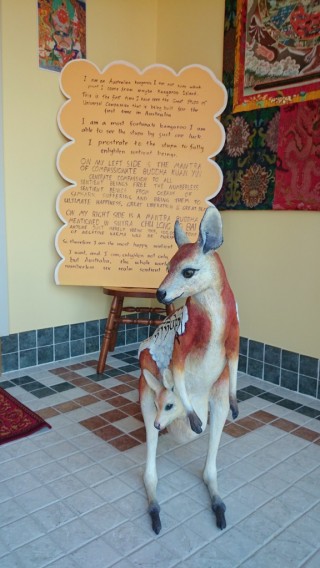
Kangaroo statue with mantras, Bendigo, Australia, December 2014. Photo by Ven. Tenzin Namgyal.
While Lama Zopa Rinpoche was in the Bendigo-area for the CPMT 2014 meeting and the retreat that followed, he added mantras to statues of an elephant and a kangaroo and wrote text for many signs to be placed next to those statues and others. The sign at right reads:
I am an Australian kangaroo, I am not sure which part I come from maybe Kangaroo Island.
This is the first time I have seen the Great Stupa of Universal Compassion that is being built for the first time in Australia.
I am a most fortunate kangaroo I am able to see the stupa by just one luck [look].
I prostrate to the stupa to fully enlighten sentient beings.
ON MY LEFT SIDE IS THE MANTRA OF COMPASSIONATE BUDDHA KUAN YIN
GENERATE COMPASSION TO ALL SENTIENT BEINGS FREE THE NUMBERLESS SENTIENT BEINGS FROM OCEANS OF SAMSARIC SUFFERING AND BRING THEM TO ULTIMATE HAPPINESS, GREAT LIBERATION & GREAT BLISS.
ON MY RIGHT SIDE IS A MANTRA BUDDHA MENTIONED IN SUTRA CHU LONG BAI DO ANYONE JUST MERELY SEEING THIS, 100,000 AEONS OF NEGATIVE KARMA WILL BE PURIFIED.
So therefore I am the most happy sentient being. I want, and I can, enlighten not only Bendigo but Australia, the whole world and all numberless six realm sentient beings.
Learn more about Lama Zopa Rinpoche, spiritual director of the Foundation for the Preservation of Mahayana Tradition (FPMT), and Rinpoche’s vision for a better world. Sign up to receive news and updates.
- Tagged: animals, art, cpmt 2014, lama zopa rinpoche
- 0
22
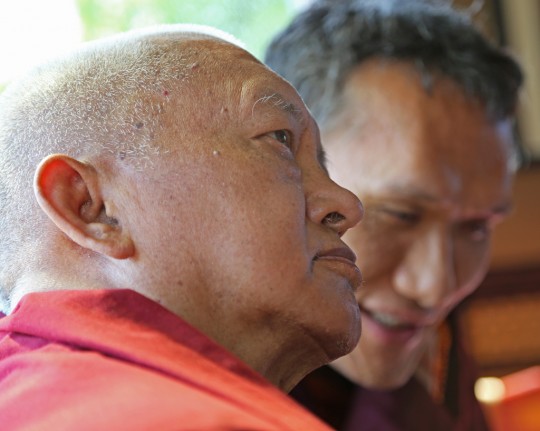
Lama Zopa Rinpoche with Yangsi Rinpoche, Portland, Oregon, US, April 2014. Photo by Ven. Thubten Kunsang.
Lama Zopa Rinpoche taught in January 9-15 at Choe Khor Sum Ling in Bangalore, India. On January 13, Ven. Roger Kunsang shared on his Twitter page:
Lama Zopa: We have had an ordinary view from beginningless time. Even [if] Buddha appeared to us, we wouldn’t recognize. [We’d] just see [him] as ordinary.
Ven. Roger Kunsang, Lama Zopa Rinpoche’s assistant and CEO of FPMT Inc., shares Lama Zopa Rinpoche’s recent pith sayings on Ven. Roger’s Twitter page. (You can also read them on Ven. Roger’s Facebook page.)
More information, photos and updates about FPMT spiritual director Lama Zopa Rinpoche can be found on Rinpoche’s homepage. If you’d like to receive news of Lama Zopa Rinpoche via email, sign up to Lama Zopa Rinpoche News.
- Tagged: lama zopa rinpoche, twitter, yangsi rinpoche
- 0
- Home
- News/Media
- Study & Practice
- About FPMT Education Services
- Latest News
- Programs
- New to Buddhism?
- Buddhist Mind Science: Activating Your Potential
- Heart Advice for Death and Dying
- Discovering Buddhism
- Living in the Path
- Exploring Buddhism
- FPMT Basic Program
- FPMT Masters Program
- FPMT In-Depth Meditation Training
- Maitripa College
- Lotsawa Rinchen Zangpo Translator Program
- Universal Education for Compassion & Wisdom
- Online Learning Center
- Prayers & Practice Materials
- Overview of Prayers & Practices
- Full Catalogue of Prayers & Practice Materials
- Explore Popular Topics
- Benefiting Animals
- Chenrezig Resources
- Death & Dying Resources
- Lama Chopa (Guru Puja)
- Lama Zopa Rinpoche: Compendium of Precious Instructions
- Lama Zopa Rinpoche: Life Practice Advice
- Lama Zopa Rinpoche Practice Series
- Lamrim Resources
- Mantras
- Prayer Book Updates
- Purification Practices
- Sutras
- Thought Transformation (Lojong)
- Audio Materials
- Dharma Dates – Tibetan Calendar
- Translation Services
- Publishing Services
- Teachings and Advice
- Find Teachings and Advice
- Lama Zopa Rinpoche Advice Page
- Lama Zopa Rinpoche: Compendium of Precious Instructions
- Lama Zopa Rinpoche Video Teachings
- ༧སྐྱབས་རྗེ་བཟོད་པ་རིན་པོ་ཆེ་མཆོག་ནས་སྩལ་བའི་བཀའ་སློབ་བརྙན་འཕྲིན།
- Podcasts
- Lama Yeshe Wisdom Archive
- Buddhism FAQ
- Dharma for Young People
- Resources on Holy Objects
- Ways to Offer Support
- Centers
- Affiliates Area
- Teachers
- Projects
- Charitable Projects
- Make a Donation
- Applying for Grants
- News about Projects
- Other Projects within FPMT
- Support International Office
- Projects Photo Galleries
- Give Where Most Needed
- FPMT
- Shop
Translate*
*powered by Google TranslateTranslation of pages on fpmt.org is performed by Google Translate, a third party service which FPMT has no control over. The service provides automated computer translations that are only an approximation of the websites' original content. The translations should not be considered exact and only used as a rough guide.The most happy thing in my life, most fulfilling thing is to work for and to benefit sentient beings. Even just the mere thought to cause happiness to sentient beings, to benefit them, to free them from suffering is the BEST offering to all the buddhas and bodhisattvas. This is the best offering, the best puja; this is what pleases their holy mind most.







